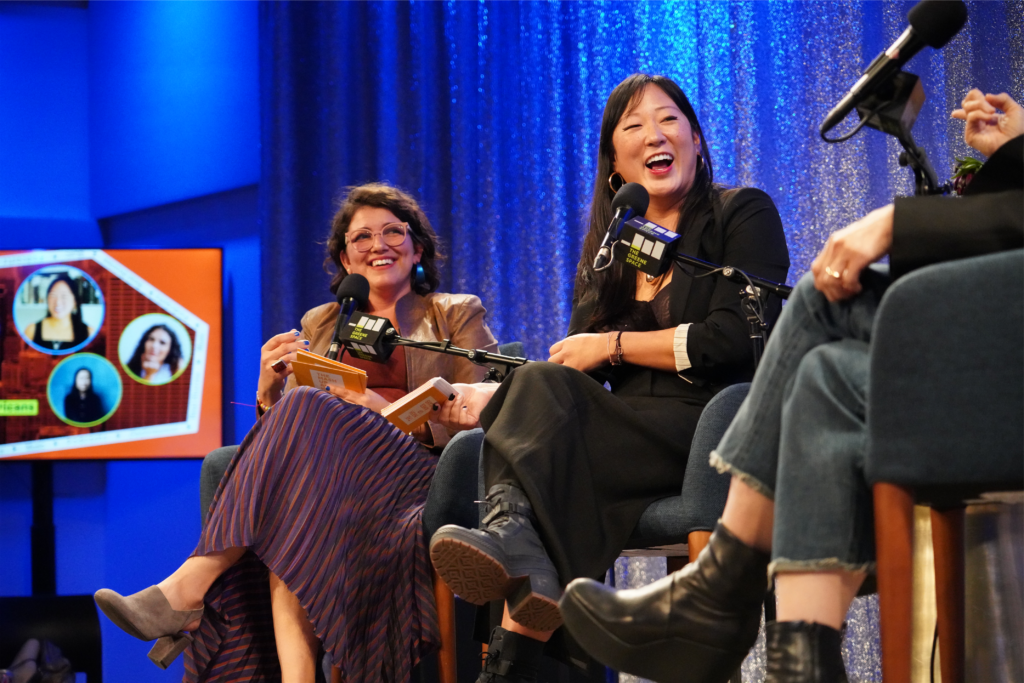Min Jin Lee is the illustrious author of Pachinko, which was a finalist for the National Book Award for Fiction. She’s also the editor for Best American Short Stories 2023, a Writer-in-Residence at Amherst College, and a director of the Authors Guild (in addition to just being an inspiring human in general). Here, we’ve rounded up some takeaways from our talk with her at The Greene Space during our inaugural residency event with WNYC, so you too can be like Min.
Make sure to listen to the full interview with Min Jin.
1. Be Awake
I think I’m always upset. Because I’m from New York. And also I’m awake. I’m awake and I’m alert. And I think that if you’re half awake and you’re taking the subway, you should be upset. The world is so unfair and people are so mean. And then there are also these moments of grace. So I keep thinking I can’t change everything, but I can change a couple of things.
2. Be pleasant, but be difficult too.
I have to be difficult [to make change], especially as an older person. I’m 54 and I feel very responsible for my young people. I guess for me, I keep thinking I have to be difficult because I have to do the right thing. However I want it to happen, so I have to be pleasant. And I can be so fucking pleasant.
3. Being a “model minority” is tired, but we can use it as a tool.
It’s such a fucking bummer if we don’t do things perfectly. So even though I am critical of this idea of being a model minority, and I am, I also notice that if we mess up, we mess up for other people. So I’m not interested in model minority-ism for me. I’ve already done that. I have a job. I’m okay. But I do notice that if I do something well, they will invite other Koreans. They will allow other Asian Americans to do things. And I actually say things like, “It wouldn’t be terrible if it’s not just me this year. They could have another Korean next year.”
4. Think of writing as a dinner party.
I don’t write for myself…Like, of course, I’ve wanted to write the things that I wanted to read. But I also would like you to read it, which means that I need to think about your pleasure and your tolerance and your clarity. And it’s always thinking about, like having dinner at my house. Like if you come to dinner at my house I will be thinking about sparkling water and flat. I will be thinking about olives and chips. And I’ll be thinking about dessert like I want to close strong. So I’ll be thinking about dessert. Absolutely. But I’m thinking about it. Because I’m thinking about your pleasure. Yes. So not just nourishment, that’s important. But it’s also about your pleasure. And I want you to remember things. I want you to have emotional responses to that evening. That was for dinner. So imagine what I’m thinking when I’m creating a book and because I’m, you’re giving me 20 hours of your life.
5. Think of your neighbors as human first.
When you’re from Queens, you don’t really think of race so much as country and ethnicity. So you don’t think of White people or Black people. I mean, it’s not a bad thing or a good thing. It’s that you’re thinking, “Oh, he’s Irish or Italian and she’s Jamaican, or she’s Haitian.” Because that’s who your neighbors are. And it’s really nice. And that just like, in second grade, you figure that out in New York, and it’s nice. It’s nice because you’re not going to be a jerk about it when other people are going through something. You’re going like, “Oh, where is she coming from? What is he thinking about?”
It’s worked out really well in my favor. I don’t think I realized what a gift it is to have come from Queens until I left Queens and I went to Yale and New Haven, and I met people and they were, how should I say this nicely? They were so used to their own way of seeing things, which was so simple. So you had all these really, really smart, attractive people, and they could be so simple. And that made me feel really sad. And they thought they were right. Because they were actually in some way, so much more fluent and cosmopolitan than I was. But then I thought, “Yeah, but you don’t know how to take the subway.”


